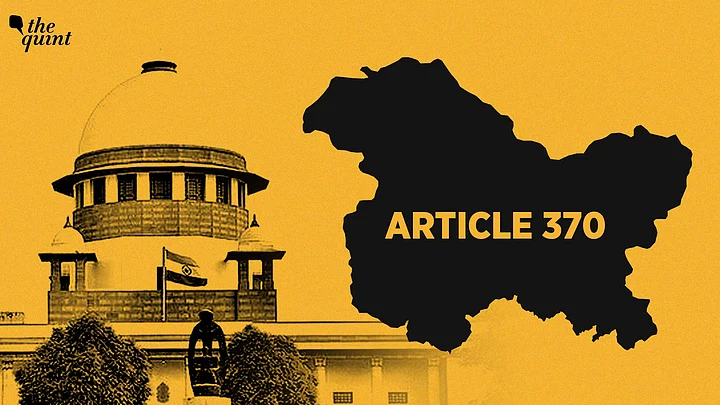Truth be told, the judgment of the Supreme Court’s five-judge Constitution Bench in the Article 370 case is yet another manifestation of the Court’s consistent deference to the political executive in the last few years.
The Supreme Court has a history of approving executive fiats that have been used to gradually erode the distinct constitutional status of Jammu and Kashmir (J&K) even prior to August 2019; the most egregious examples being the judgments in Sampat Prakash v State of J&K (1968) and Mohammed Maqbool Damnoo v State of J&K (1972).
Although such judgments highlight a clear departure from the distinct constitutional position of J&K within the Indian Union, some of them were, at least, carefully crafted by the Court signalling an engagement with constitutional principles.
This time around, however, the message is loud and clear: it doesn't really matter to have a legal and constitutional architecture in place saddled on the promised autonomy in favour of a federal unit. Throughout the judgment, the Court has purportedly disregarded constitutional principles.
In this article, I explain four important aspects that unequivocally validate the Supreme Court’s deferential stance towards the executive powers that be.
Semi-autonomous Status of J&K and an Established Constitutional Framework
First, the judgment is a carte blanche to the political executive to abrogate the semi-autonomous status of J&K, unilaterally.
In effect, the Court has ruled that the President of India can abrogate Article 370 even after the dissolution of the ‘Constituent Assembly’ of the State – something that formed the bedrock of the special constitutional arrangement between J&K and the Indian Dominion.
This is precisely the outcome of the Court’s methodical refusal to consider an equal judge Bench judgment of Prem Nath Kaul v State of J&K (1959) in Sampat Prakash, and most recently, Shah Faesal and Ors. v Union of India (2020).
Interestingly, Prem Nath drives home the centrality of the concurrence of J&K’s Constituent Assembly to the scheme of things under Article 370, both for the extension of different Articles of the Constitution and the abrogation of Article 370 itself.
However, the Court’s stance essentially boils down to this assertion: the President could have abrogated Article 370 even without taking recourse of Article 367, changing the reference to ‘Constituent Assembly ‘to ‘Legislative Assembly’ under Article 370.
Second, the Court’s defiance of the established constitutional framework, particularly, on federalism and sovereignty, reverberates throughout the judgment.
A particularly glaring testament to this is the Court’s denial of the State’s retention of sovereignty, arguing that J&K had surrendered full sovereignty with the issuance of a Proclamation by Yuvraj Karan Singh in November 1949.
Whereas, in reality, the Proclamation had a limited purpose - to oversee the transition from the applicability of the Government of India Act, 1935, on J&K to the Constitution of India. Far from putting up a robust academic explanation, the Court adopted a convenient ‘pick and choose’ method, citing the absence of a reference to sovereignty in J&K’s Constitution to substantiate the claim.
Vast swathes of scholarship have evidentially established an undeniable fact - the J&K State ceded external sovereignty only and retained internal sovereignty.
It’s bemusing to see the Court forgetting its own precedents like the one in Government of NCT of Delhi v Union of India & Another (2023) which held that the division of internal sovereignty by a distribution of legislative powers is an essential feature of federalism. Long back, in S.R. Bommai v. Union of India (1994), the Court ruled: ‘states are sovereign in the field left to them and they have the plenary power to make laws accordingly’.
The Court’s Refusal to Scrutinise the Legality of Stripping J&K’s Statehood
Third, the judgment is a frontal assault on the constitutional edifice of Article 370 by reductively interpreting it as an interim arrangement due to ‘war conditions in the state’. Such a dismissal of the context in which the Article was conceived reeks of a deliberate omission.
On the contrary, Article 370 was intended to be permanent as neither J&K’s Constituent Assembly made a recommendation nor the President issued an order declaring that the Article shall cease to be operative.
Article 370’s ‘temporariness’, as delineated in the marginal note, arose from India's promise of a plebiscite to the Kashmiri leadership and the United Nations Security Council.
Hence, even Article 1 of the Indian Constitution was applied to J&K transitionally within the context of Article 370.
Fourth, the Court’s refusal to scrutinise the legality of stripping J&K’s statehood on the Solicitor General’s assurance of its restoration defies logic.
By refusing to examine the constitutionality behind degrading J&K into two Union Territories, the Court reveals a glaring inefficiency. This omission showcases a serious lapse in the Court’s ability to uphold justice and constitutionality.
Given the history of mishandling and misappropriating people’s will, the Supreme Court judgment should come as a surprise to no one. The Court has continued to uphold the government’s agenda with respect to the present and future of Jammu and Kashmir.
With the continuous degradation of the constitutional identity of J&K, the Court continues to disappoint and justice remains a far cry.
Unmoored by the supposed liberal takes and false hopes of restorative justice for the people of Kashmir, this ruling leaves a lot to be desired.
(Burhan Majid is an Assistant Professor of Law at the School of Law, Jamia Hamdard, and a doctoral fellow at NALSAR University of Law, Hyderabad. This is an opinion piece and the views expressed are the author’s own. The Quint neither endorses nor is responsible for them.)
